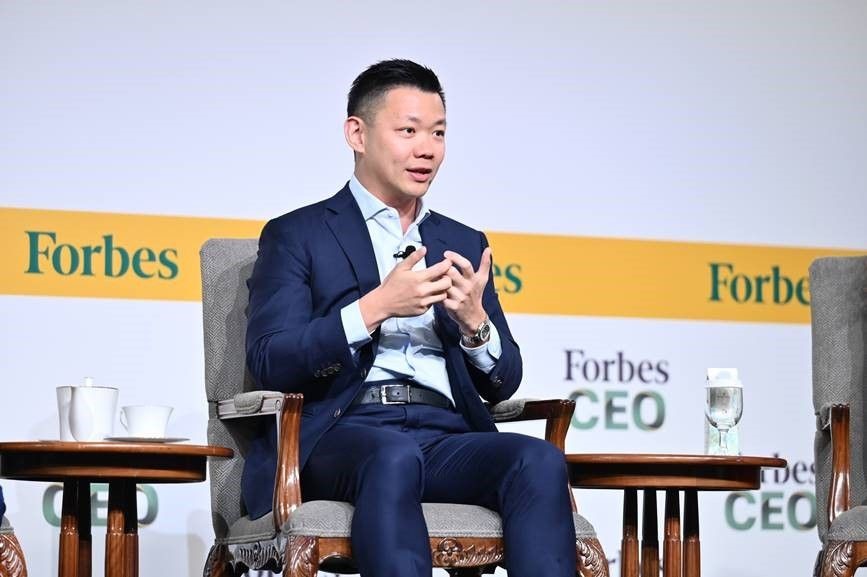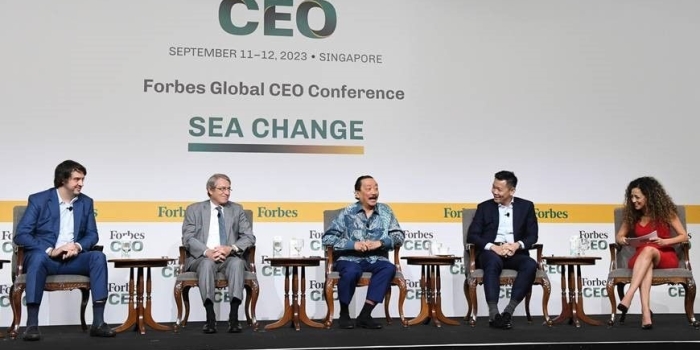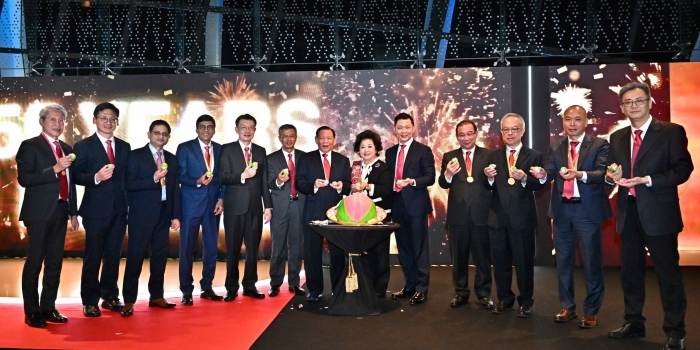The 21st Forbes Global CEO Conference was held from 11-12 September in Singapore, and gathered some 450 prominent business leaders from around the world. The international panel of leading CEOs, thought leaders, entrepreneurs and investors discussed their ideas on navigating the new normal of the geopolitical and trade landscape.
The event was also attended by Heng Swee Keat, Deputy Prime Minister and Coordinating Minister for Economic Policies, Republic of Singapore, as well as Sri Mulyani Indrawati, Minister of Finance, Republic of Indonesia.
RGE’s Managing Director, Anderson Tanoto, took part in a panel discussion titled “Resetting Priorities”, alongside Mark Dalio, Cofounder and Co-CEO of OceanX; Harald Link, Chairman, B.Grimm; and Vincent Tan, Founder and Advisor, Berjaya Corporation Group of Companies.
Anderson shared his insights on the green transition and the benefits it can bring to businesses, as well as the roles that businesses can play in furthering philanthropic causes.
How businesses can embrace ESG
One of the key topics discussed during the panel discussion was how and why industries could and should move towards greener practices. Mr Tanoto cited the positive impact that electrification can have on energy emissions, highlighting the construction of Pacific Energy’s Woodfibre LNG facility in Canada as a prime example. Utilising electric-drive for compressors in the facility, “we were able to reduce the emissions to 11% of a regular LNG plant,” he said. He also shared details about Bracell’s Sao Paulo cellulose pulp works being designed to run carbon neutral principles.
“We plan to reduce our emissions by 40% by 2030 across the board,” he added, noting RGE’s firm commitment to decarbonisation across all its businesses. As one of the world’s leading resource-based manufacturing groups, RGE has been at the forefront of building and implementing sustainable practices throughout its supply chain.
Mr Tanoto also noted the paradigm shift that he foresees businesses experiencing with respect to attitudes towards sustainability. He shared his thoughts that many businesses stand to benefit from the growing opportunity that a demand for sustainability will bring. “You can make good money out of going green,” he said.
When asked by a member of the audience for advice on running a business sustainably, he reiterated the point. “As entrepreneurs, if there’s demand for a sustainable product, we should pursue it – I think there’s a huge opportunity there,” he said.

Balancing philanthropy, ESG and business
Mr Tanoto shared his thoughts on the importance of preserving biodiversity, and the significance of reducing emissions sustainably. “If you deforest natural forests and plant agriculture, that’s not sustainable. How you go about reducing emissions is very, very important,” he said. He also shared the importance of raising public awareness for ESG concerns, and the value in objectifying carbon emissions. “What is out of sight is out of mind,” he said.
As the panel discussion delved deeper into how businesses can better participate in philanthropic and ESG causes, Mr Tanoto shared his approach with the Tanoto Foundation, and its widespread efforts in promoting access to quality education and early childhood developmental support. “We’ve taken the approach to split our family foundation and our businesses as two independent organisations.” He cited that in order to effect true change, philanthropic efforts must be focused, and highly directed.
“The thinner you spread yourself, the less the impact is,” he said.
Mr Tanoto further underlined the need for focus and direction in philanthropy, speaking in depth about the Tanoto Foundation’s efforts in increasing access to quality education in Indonesia. “They’re going to school and not learning. The quality of education is where the biggest challenge is.”
Anderson urged business leaders to place greater scrutiny on the true impact of their philanthropic efforts. “How can we ensure that we invest not only in giving, but also measuring the impact of what we give,” he said.
Mr Tanoto also highlighted the importance of collaboration in bringing about change, citing the Tanoto Foundation’s numerous partnerships with organisations such as the World Bank and the Gates Foundation. Addressing a key challenge that philanthropic organisations face, Mr Tanoto noted the ineffectiveness of “A charitable dollar only has one life. We can create larger impact not by ourselves, but together,” he said.







